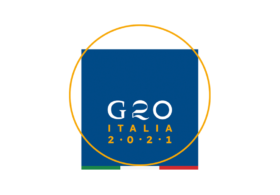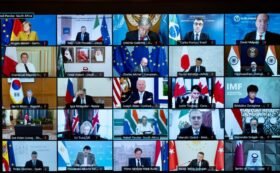ROME, OCTOBER 12 – G20 leaders gathering over Afghanistan gave a mandate to the United Nations in order to coordinate the response and act directly. It was, in the words of Italian Prime Minister Mario Draghi, “the first multilateral response to the crisis” which erupted in mid-August after the Afghani capital Kabul fell under the rule of the Taliban.
The meeting started from the “awareness that the humanitarian emergency is very serious”, said Draghi who strongly pushed for the extraordinary meeting convened by the Italian Presidency of the G20 and enlarged to the Netherlands, Spain, Singapore and Qatar, as well as several other international organizations, including the United Nations, World Bank and International Monetary Fund. Leaders reiterated their commitment to the fight against terrorism, including the threat posed by ISIS-K, and to ensure safe passage of foreigners and Afghans seeking to leave the country, but also to provide humanitarian assistance directly to the Afghans and to promote human rights for all, including women, girls and minorities, said US President Joe Biden. In turn, “the US remains committed to working with the international community to address the situation in Afghanistan and support the Afghan population”, POTUS added.
Multilateralism is back at the centre of the working methods of the most important countries in the world. A first concrete pledge came from the European Union, represented by its political leaders, Charles Michel and Ursula von der Leyen, with the deployment of 1 billion euros of aids to the Afghan population and the aim of reaching directly to the population through NGOs, avoiding the Taliban government. At the core of the summit was also the protection of rights, which appears at the top of the list of shared principles in the final document. “Everyone touched the issue of women’s rights, to guarantee them the right to education and not to go back 20 years”, explained Draghi. “Dealing with the humanitarian crisis will require contact with the Taliban, but this – the PM said – does not mean their official recognition”.
Draghi defined the summit “satisfactory and fruitful”, underlining the “common point of view on the need to address the humanitarian emergency”, despite the defections of the presidents of China and Russia, Xi Jinping and Vladimir Putin, which delegated ministers and regional representatives, while next week a summit to which the Taliban government has been invited will take place in Moscow. However, this absence was not determined by foreign policy reasons, said Italian Prime Minister, adding that it will be “essential for Russia and China to participate in person to the G20” leaders summit in Rome on 30-31 October.
Minister of Foreign Affairs Luigi Di Maio opened the path to today’s meeting in New York during the high-level week of the UN General Assembly. He called for increased funding for cooperation in Afghanistan to help civilians “because we must ensure that the Afghan state apparatus does not collapse”. Otherwhise “we will see uncontrolled migratory flows to neighbouring countries, resulting in a destabilisation”. Di Maio talked about this issue in New York to UN Secretary-General Guterres: “In order to prevent economic collapse we must find a mechanism to finance the state without giving money to the Talibans”.
 Guterres himself noted in a statement on the eve of the meeting that “the Talibans have betrayed their ‘promises’ on women’s rights”. “I am particularly alarmed to see the promises made to Afghan women and girls by the Taliban being betrayed. I make a strong appeal to the Taliban to keep their promises and to respect their obligations under international humanitarian law”, the Secretary-General added. “If we do not act and help the Afghans to overcome this storm, and we do so soon, not only them, but the whole world will pay a heavy price”. Currently, at least 18 million people, or about half of the country’s population, are affected.
Guterres himself noted in a statement on the eve of the meeting that “the Talibans have betrayed their ‘promises’ on women’s rights”. “I am particularly alarmed to see the promises made to Afghan women and girls by the Taliban being betrayed. I make a strong appeal to the Taliban to keep their promises and to respect their obligations under international humanitarian law”, the Secretary-General added. “If we do not act and help the Afghans to overcome this storm, and we do so soon, not only them, but the whole world will pay a heavy price”. Currently, at least 18 million people, or about half of the country’s population, are affected.
“Without food, without work, without their rights protected, we will see more and more Afghans fleeing their homes in search of a better life. The flow of illicit drugs, criminal networks and terrorism is also likely to increase”, warned Guterres, “this will not only seriously affect Afghanistan itself, but also the region and the rest of the world”. (@giorgiodelgallo)


